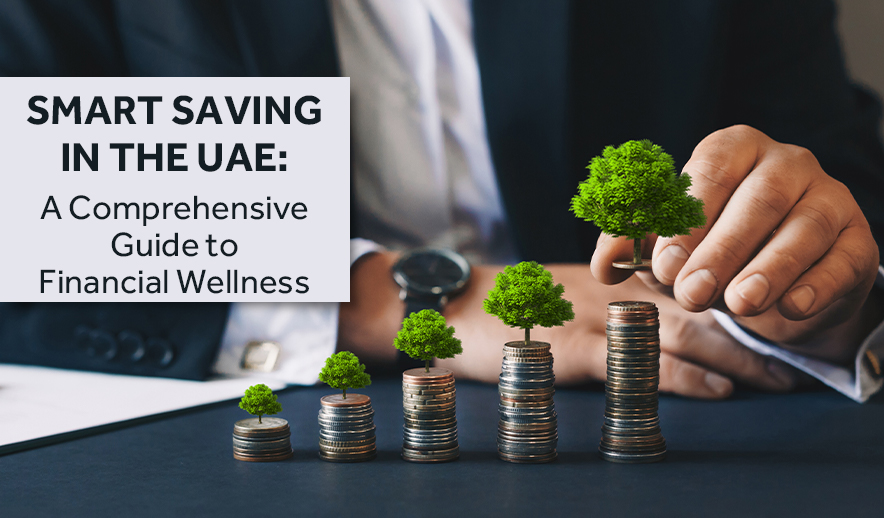
Smart Saving in the UAE: A Comprehensive Guide to Financial Wellness

Introduction:
In the vibrant and dynamic financial landscape of the United Arab Emirates (UAE), cultivating a habit of saving is crucial for long-term financial stability. With its cosmopolitan cities and diverse opportunities, the UAE offers a unique set of challenges and opportunities for individuals seeking to build a robust financial future. This article aims to provide a comprehensive guide on how one can effectively save money in the UAE.
Understand the Cost of Living:
Begin by gaining a thorough understanding of the cost of living in the UAE. Recognize that certain expenses, such as housing and education, may constitute a significant portion of your budget. Dubai, ranked 18th globally in Mercer’s ‘Cost of Living City Ranking 2023,’ stands as the 2nd most expensive city for expatriates in the Middle East. Rental costs, particularly in Dubai, significantly influenced the rankings, with a 25% increase, while Abu Dhabi climbed to 43rd place. Besides rising rents, both cities experienced higher costs in categories such as food, transportation, and sports/leisure, reflecting the overall challenges of a high cost of living in the UAE.
Create a Detailed Budget:
Develop a comprehensive budget that considers your income, fixed expenses (rent, utilities, etc.), variable expenses (groceries, entertainment), and savings goals. Tailor your budget to the specificities of living in the UAE. Below are some key factors on why one should consider budgeting.
- Take control of your money
- See your income and expenses.
- Know where you stand financially.
- Direct money to your priorities
- Find a balance between saving and spending.
Explore Tax-Free Savings:
Leverage the tax-free environment in the UAE to maximize your savings. Unlike many other countries, the UAE does not impose income tax on individuals, allowing you to retain a larger portion of your earnings.
Automatic Savings Plans:
Capitalize on automatic savings plans offered by banks and financial institutions in the UAE. Setting up automatic transfers to a savings account ensures consistency in saving without the need for manual intervention. These plans allow you to automatically transfer a set amount of money from your checking account to your savings account each month, making it easy to save money without having to think about it. Many banks in the UAE offer automatic savings plans, and you can typically choose the amount you want to save and the frequency of your transfers. Automatic savings plans can help you reach your financial goals faster, and they can also help you develop good financial habits.
Take Advantage of Employer Benefits:
Many employers in the UAE offer benefits such as provident funds, savings plans, or retirement contributions. Familiarize yourself with your employer’s offers and take full advantage of these benefits to boost your savings.
The UAE government’s voluntary retirement plan allows private and free zone sector employees to invest in end-of-service benefits without a minimum salary requirement. Employers, though not mandated, must register with the Ministry of Human Resources and Emiratization to participate. Contributions vary, with employers contributing 5.83% for employees under five years and 8.33% for those over five years of service.
Be Mindful of Currency Exchange Rates:
For expatriates in the UAE, fluctuations in currency exchange rates can impact your purchasing power and the value of your savings. Stay informed about exchange rates and consider strategic timing for international transfers.
Explore High-Interest Savings Accounts:
Investigate high-interest savings accounts offered by banks in the UAE. These accounts often provide better returns on your savings compared to regular savings accounts.
Minimize Debt:
Prioritize reducing and eliminating high-interest debts. The UAE has a competitive financial market, and minimizing interest payments will free up more funds for savings.
Embrace a Thrifty Lifestyle:
UAE offers a luxurious lifestyle, but embracing a thrifty mindset can significantly impact your savings. Look for cost-effective alternatives, shop during sales, and be discerning about discretionary spending. The low saving rates in the UAE stem from increased non-essential spending, driven by millennials striving to maintain a “Dubai lifestyle” beyond their means. Experts attribute this trend to financial illiteracy, subpar returns on savings, and easy access to credit and buy-now-pay-later options. The absence of income tax in the UAE, coupled with its high-quality lifestyle, attracts a diverse population. Financial advisors emphasize the need for responsible spending habits, cautioning against overspending on luxuries and encouraging a more prudent approach to personal finance.
Take Advantage of Loyalty Programs:
Many businesses in the UAE offer loyalty programs that provide discounts, cashback, or points redeemable for future purchases. Participating in these programs can lead to substantial savings over time.
Invest in Education and Professional Development:
Investing in education and professional development can enhance your skills and potentially lead to higher earning opportunities in the long run. Consider enhancing knowledge by enrolling into certifications or courses that align with your career goals.
Diversify Investments:
Explore diversified investment options in the UAE, considering factors such as risk tolerance and financial goals. Real estate and mutual funds are popular investment avenues in the region.
Conclusion:
Saving money in the UAE requires a strategic and informed approach. By understanding the unique financial landscape, embracing smart budgeting, and taking advantage of the myriad opportunities available, individuals can pave the way for financial wellness and long-term prosperity. Whether you are a resident or an expatriate, adopting these saving strategies will contribute to a secure and thriving financial future in the UAE.



